- Home
- Michael Ondaatje
The Cat's Table Page 7
The Cat's Table Read online
Page 7
‘It’s Colombo tea, not ship tea,’ he said, adding condensed milk into the cup. The man knew what good tea was. So far, we had been served what tasted like dishwater on the ship, and I had stopped drinking it. In fact, I would not drink tea for years. But the Baron made me my last good cup of tea. He had brought out very small cups, so I had to have several that day.
The Baron told me I was athletic. He walked me to his door and pointed to the window above it. It was rectangular and had a small latch that could secure it shut. Now the glass lay horizontal, flat like a tray, allowing the air to come into and go out of the room.
‘Think you can climb through that?’ Not waiting for an answer, he cupped his hands and made me climb onto them and up onto his shoulders. I was six feet from the ground. I began crawling into the opening, precarious on the glass and its wooden frame, scared I would fall through. Protecting this open space further were two horizontal bars. He asked me to try working my body between them, but I could not get through.
‘It is no use. Get down.’ I put my knees on his shoulders again and held on to his brilliantined hair and climbed down, feeling I had betrayed him in some way, especially after the ice cream and the good tea.
‘I’ll have to try someone else,’ he murmured to himself, as if I were no longer in his presence. And then, conscious of my disappointment, he said, ‘I am sorry.’
The next day I saw the Baron at the pool speaking with another boy, who a short while later accompanied him to the upper deck. He was smaller than I was, though perhaps not as athletic, because the boy returned within an hour and talked only about the tea and biscuits he had been given. Then, perhaps a day after that, I was invited by the Baron to come to his cabin and attempt to climb through that window again. He had, he said, another idea. As we passed the steward who guarded the entrance to First Class, the Baron said, ‘My nephew – having him over for tea.’ And soon I was strolling legally through the carpeted lounge, keeping my eyes open for Flavia Prins, for this was also her territory.
He had asked me to wear my swimsuit, and when I removed the rest of my clothes he brought out a small pail of motor oil that he’d managed to get from the engine room, and made me spread the thick black liquid all over my body from the neck down. Then once again I was hoisted up to the open window, beyond which were the two horizontal bars. And this time, covered in oil, I slid through like an eel and dropped to the floor of the corridor on the other side of the door. I knocked and he let me back in. He was grinning.
Immediately he gave me a bathrobe to wear and we went along the empty corridor. He knocked at a door, and when there was no response he hoisted me up with his palms, and this time I slipped through the open window the other way, into a stateroom. I unlocked the door from inside, and as the Baron entered, he patted me on the head. He sat in an armchair briefly, winked at me, then got up and began looking around the room, opening up a few cupboard drawers. We were out in minutes.
Looking back, I think he may have convinced me that the breaking and entering that followed was a private game between him and some friends. For what he was doing seemed relaxed and good-natured. He strolled through a suite, his hands casually in his trouser pockets as he peered at objects on a shelf or a desk, or glanced into further rooms. I recall he once found a large sheaf of papers that he dropped into a sports bag. I also saw him pocket a silver-bladed knife.
While he did this, I was mostly looking out from one of the portholes at the sea. If they were open I’d hear yells from quoits players on a lower deck. That was the excitement for me, and being in such a large cabin. The one I shared with Mr Hastie was about the size of a stateroom’s large bed. I walked into one fully mirrored bathroom and suddenly saw receding images of myself, semi-naked, covered in black oil, just a brown face and spiky hair. There was a wild boy in there, somebody from one of the Jungle Book stories whose eyes watched me, white as lamps. This was, I think, the first reflection or portrait that I remember of myself. It was the image of my youth that I would hold on to for years – someone startled, half formed, who had not become anyone or anything yet. I became aware of the Baron on the edge of the mirror frame, watching me. He had a considering look. It was as if he understood what I was seeing in the mirror, as if he too had done that once. He threw me a towel and asked me to clean myself up and put on the rest of my clothes, which he’d brought in his sports bag.
I could not wait to tell the others at the next turbine room meeting what had happened to me. I felt my authority grow. But in retrospect I see that what the Baron gave me was another self, something as small as a pencil sharpener. It was a little escape into being somebody else, a door I would postpone opening for some years, at least until I was beyond my teens. Those half-blurred afternoons remain with me. I remember one day, after he had knocked on a door and got no reply and I had slid through the bars of the window frame and let him in, we were shocked to find someone asleep in the large bed, the table beside him arrayed with medicine bottles. The Baron held up his palm for silence, went closer, and stared at the comatose body, which I would realise later was Sir Hector de Silva. The Baron touched my shoulder and gestured to a metal bust of the millionaire on the dresser. While the Baron continued looking around the room for valuables – gems, I supposed; that was, after all, what thieves seemed to take – I looked back and forth, comparing the metal head with the real one. The bust made the sleeping man look leonine and noble, in contrast to the reality that rested on the pillow. I tried lifting the bust into my arms, but it was too heavy.
The Baron now leafed through documents but did not take any. Instead he plucked a small green statue of a frog off the mantelpiece. ‘Jade,’ he bent down and whispered to me. And then, almost too personally, he took a photograph of a young woman that was in a silver frame beside the man’s bed. He told me, as we walked down the corridor a few minutes later, that he found her very attractive. ‘Perhaps,’ he said, ‘I will meet her at some point during this journey.’
The Baron would disembark, prematurely, at Port Said, for by then, suspicions of a thief on board were making the rounds, although they were not of course directed at anyone in First Class. I know that at Aden he mailed off some packages. In any case, all of a sudden he stopped asking me to meet him. He took me for a final tea in the Bedford Lounge, and I hardly saw him from then on. I never knew whether he had been stealing simply to cover his First Class passage or to give money to an ailing brother or some old partner in crime. He seemed to me a generous man. I still remember how he looked, how he dressed, although I am not sure if he was English or one of those mongrels who have assumed the panache of aristocracy. I do know that whenever I am in a country where they put up the faces of criminals in post offices, I look for him.
OUR SHIP CONTINUED to move north-west, crossing into higher latitudes, and the passengers could feel the nights becoming cooler. One day we were told over the loudspeakers that a film would be shown after the dinner sitting, on the deck outside the Celtic Room. By dusk stewards had set up a stiff sheet at the stern and brought out a projector, which they covered mysteriously. Half an hour before the film began, about a hundred people had made up a restless audience, the adults sitting on chairs, the children on the deck itself. Ramadhin and Cassius and I got as close to the screen as possible. This was our first film. There was a loud crackling in the speakers, and suddenly images were thrown onto the screen, which was surrounded by a receding purple sky.
We were just days away from landing in Aden, so the choice of The Four Feathers was, I see now, somewhat tactless, as it attempted to compare the brutality of Arabia with a civilised though foolish England. We watched an Englishman having his face branded (we got to hear the sizzle of his flesh) so that he could pass himself off as an Arab in an invented desert nation. An old general in the story referred to the Arabs as something like ‘the Gazarra tribe – irresponsible and violent’. Later another Englishman was blinded by staring at the desert sun, and he wandered slowly about for the rest of the
film. As for the subtler issues of jingoism and cowardice in a time of war, those were blown away by the strong winds into the passing ocean. The sound system was not good, besides which we were not used to atonal English accents. We simply followed the action. There was also the possibility of an additional subplot: for our ship was approaching a storm zone, and if we turned our heads away from the drama on the screen we could see forks of lightning in the distance.
The movie, as we rolled under the gradually disappearing stars, was being shown in two locations. It had begun half an hour earlier in the Pipe and Drums Bar in First Class, projected to a quieter group of about forty well-dressed passengers; when the first reel was over, that segment of the film was rewound and carried in a metal container down to our projector on deck for its alfresco showing, while the First Class audience watched the second reel. As a result, there were confusing fall-outs of sound that merged the two screenings. The volume on every speaker was turned to maximum because of the roar of the sea winds, and we were constantly assaulted by contrapuntal noises; while watching a tense scene we could hear rousing songs in an officers’ mess. Still, our alfresco showing had the atmosphere of a night picnic. We were all given a cup of ice cream, and as we waited for the First Class reel to be over and then threaded onto our projector, the Jankla Troupe performed. They were doing a juggling act with large butcher knives just at the moment we heard the bloodthirsty screaming of attacking Arabs from the speakers in First Class. The Jankla Troupe was parodying these yells with comic body movements, and then The Hyderabad Mind stepped forward to announce that a brooch someone had lost the day before could be found hanging over the projector’s lens. And so, just as First Class was witnessing the brutal massacre of English troops, exultant cheers rose from our audience.
Our film proceeded on the seemingly live canvas of a flapping screen. The plot was full of grandness and confusion, of acts of cruelty that we understood and responsible honour that we did not. Cassius would go around for days claiming to be part of ‘the Oronsay tribe – irresponsible and wiolent.’
Unfortunately, the anticipated storm burst loose over the ship, and as the rain hit the projector the hot metal began hissing. A steward attempted to hold an umbrella over it. A gust ripped the screen loose and sent it skittering over the ocean like a ghost, and the images continued to be shot out, targetless, over the sea. We never learned the end of the story, not on that journey. I did a few years later, by reading A. E. W. Mason’s novel in the Dulwich College library. He turned out to be an old boy of the school. In any case, that night saw the beginning of violent storms that assaulted the Oronsay. It was only after this was over that we escaped the turmoil of the ocean and landed in the real Arabia.
THERE ARE TIMES when a storm invades the landscape of the Canadian Shield, where I live during the summers, and I wake up believing I am in mid-air, at the height of the tall pines above the river, watching the approaching lightning, and hearing behind it the arrival of its thunder. It is only from such a height that you see the great choreography and danger of storms. In the house, a few bodies are asleep, and near them the hound, her ears tormented, shaking, as if her heart is about to collapse or be flung out. I have seen her face in the half-light of such storms as if within the velocity of some space-travel experiment, the normally beautiful features thrust back. And while the others sleep, rocked in this wild nature, only the river below looks stable. During the rips of light, you see the acres of trees capsized, everything tilted in a biblical palm. A few times every summer this happens. I expect and so prepare for the arrival of the thunder with this dog, this sweet hunter.
Of course there is a why to all this. For I have been in that hovering unsafe place with no grounding to the unknown miles below. All these years later it returns – the night with Cassius after we had tethered ourselves to the deck of the ship in preparation for what we thought would be an exciting adventure.
Perhaps it had been the failure of that film to satisfy us. I still cannot explain why we did what we then did. It may simply have been because it was to be our first sighting of a storm at sea. After the projector had been rolled away and the chairs stacked, there was a sudden lull upon the ocean and in the sky above us. So that now, even though we were told that the radar had blinked the existence of another approaching upheaval, the winds had quieted, and this gave us time to prepare ourselves.
It was Cassius, of course, who persuaded me into the best seat in the house for the catastrophe. We talked it over near the lifeboats. Ramadhin did not wish to participate, but he offered to help set it up. A day earlier we had come across some ropes and tackle in a storeroom that had been left open during the lifeboat drill. And so, that night during the lull, while nearly all the other passengers had returned to their cabins, we made our way to the open Promenade Deck, near the bow, and found various permanent objects we could attach ourselves to with the ropes. We heard the Captain announce that they were expecting a fifty-knot gale and to prepare for the worst.
Cassius and I lay on our backs, side by side, and Ramadhin began to tie us with ropes to some V-shaped rivets and a bollard. He was hurrying, for he could see the storm coming. He checked his knots in the darkness and left us there, spreadeagled and tightly harnessed. The deck was deserted, and not much happened for a while, save for a light rain. Perhaps we had veered away from the storm. But then the gale hit and pulled the air out of our mouths. We had to turn our heads away from its rush in order to breathe, the wind buckling like metal around us. We’d imagined lying there conversing in wonder about the lights of the storm at some great height above us, but we were now almost drowning from the water in the air – the rain, and the sea that was leaping over the railings and swirling across the deck. Lightning lit the rain in the air above us, and then it was dark once more. A loose rope was slapping at my throat. There was only noise. We could not tell if we were screaming or only trying to.
With each wave it sounded as if the ship was breaking apart, and with each wave the wash covered us until we were tilted upright again. We were aware of a constant rhythm. Whenever the ship ploughed into the oncoming sea, we were swept around within the surf, unbreathing, while the stern rose into the air, the propellers out of their element screaming till they fell back down into the sea, and we on the bow leapt up again, unnaturally.
As I lay on the Promenade Deck of the Oronsay, during those few hours when we believed we had given up any chance of our lives, everything coalesced. I was something orderless in a jar, unable to escape what was happening, unable to get out of what was occurring. All I held on to was that I was not alone. Cassius was with me. Now and then our heads turned simultaneously in the lightning and we each saw the blunt, washed-out face of the other. I felt I was caught in this place. If and when the ship pivoted its nose down and descended, overcome by some towering wave, Cassius and I would still be permanently tied to a pump generator or some such thing. There was no one else. We were the only ones on the surface of the ship, as if staked out for sacrifice.
The waves shattered, rolled over us, and disappeared overboard as quick as a nightmare. Then we rose. Then we dropped into the next valley. All that was holding us to safety was Ramadhin’s slight knowledge of knots. What did he know of knots? We assumed in our death throes that he had no knowledge of them. We were not safe at all. There was no sense of time. How long were we there before we were blinded by searchlights focused down from the bridge onto the two of us? Even in our frayed state we sensed the outrage behind the light. Then it went out.
Later we learned all the names for storms. Chubasco. Squall. Cyclone. Typhoon. And later we were told what it was like below deck, how the stained-glass windows in the Caledonia Room shattered and the electrical circuits burned out almost at once, so there were flashlights moving up and down the hallways, swaying their beams into the bars and lounges as people searched for missing passengers. Lifeboats broke partially free of their davits and hung tilted in mid-air. The ship’s compasses spun. Mr Hastie and Mr
Invernio were in the lightless kennels attempting to calm the dogs tormented by the thunder in their ears. One wave hit the Assistant Purser, and the force of it washed out his glass eye. All this while our heads were stretched back to try to see how deep the bow would go on its next descent. Our screams unheard, even to each other, even to ourselves, even if the next day our throats were raw from yelling into that hallway of the sea.
It seemed like hours before someone nudged me. The storm was still active but calm enough now to send three sailors out to our rescue. They cut the ropes, the swelling knots had fused, and we were carried down a flight of stairs to a dining cabin that was doubling as a medical centre. There had been a few bashes to the head and broken fingers during the last hour or two. We were stripped down and each given a blanket. We were told we could sleep there. I recall that when I was lifted by the sailor, there was such warmth in his body. I remember that when someone removed my shirt he said that all of the buttons had been knocked loose.
I saw Cassius’s face as if all intricacy had been washed away. Then, just before we fell asleep, Cassius leaned over and whispered, ‘Don’t forget. Someone did this to us.’
A few hours later three officers were sitting across from us. We had been woken and I was now expecting the worst. We would be sent back to Colombo, perhaps, or beaten. But as soon as the officers sat down, Cassius said, ‘Someone did this to us, I don’t know who … They were masked,’ he added.
This startling revelation meant the interrogation by the officers would take much longer, in order for us to convince them this was the truth, though the burn marks from the ropes partly told them we could not have done this to ourselves. They offered us some ship tea, and we thought we had got away with our story, when a steward came in and said the Captain wished to see us. Cassius winked at me. He had often spoken of wanting to see the Captain’s cabin.

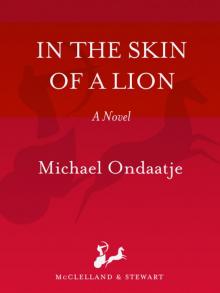 In the Skin of a Lion
In the Skin of a Lion The Cinnamon Peeler
The Cinnamon Peeler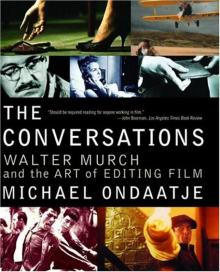 The Conversations: Walter Murch and the Art of Editing Film
The Conversations: Walter Murch and the Art of Editing Film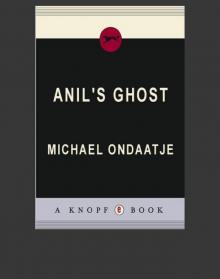 Anil's Ghost
Anil's Ghost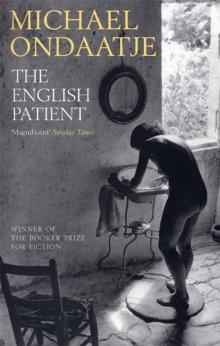 The English Patient
The English Patient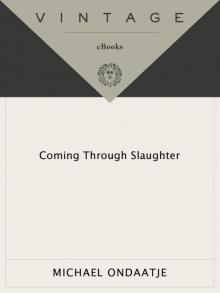 Coming Through Slaughter
Coming Through Slaughter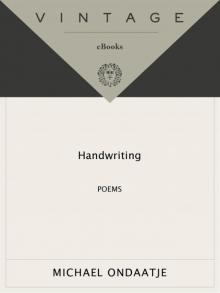 Handwriting
Handwriting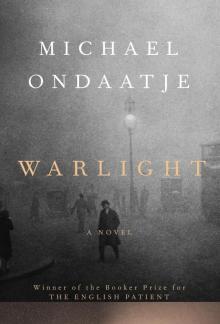 Warlight
Warlight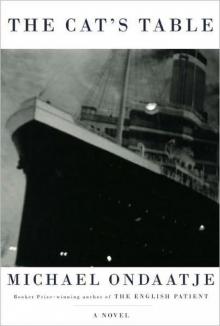 The Cat's Table
The Cat's Table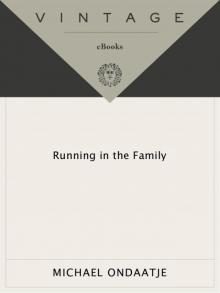 Running in the Family
Running in the Family The Collected Works of Billy the Kid
The Collected Works of Billy the Kid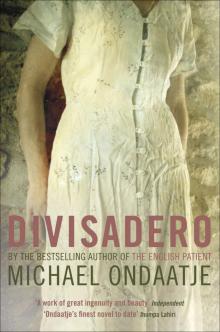 Divisadero
Divisadero